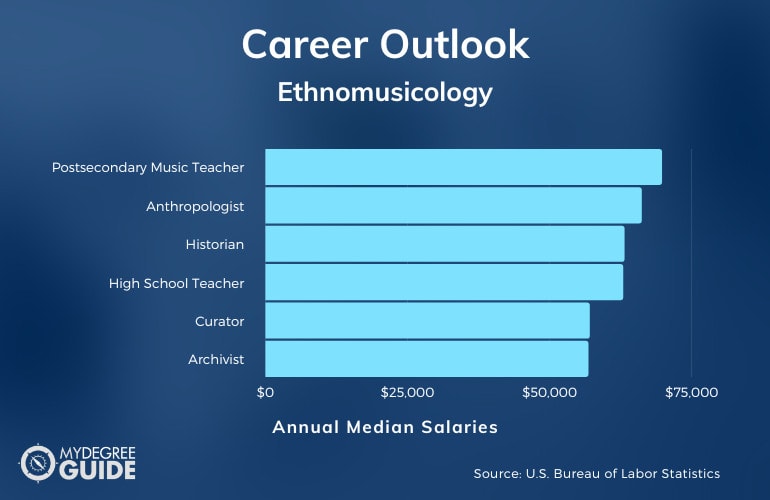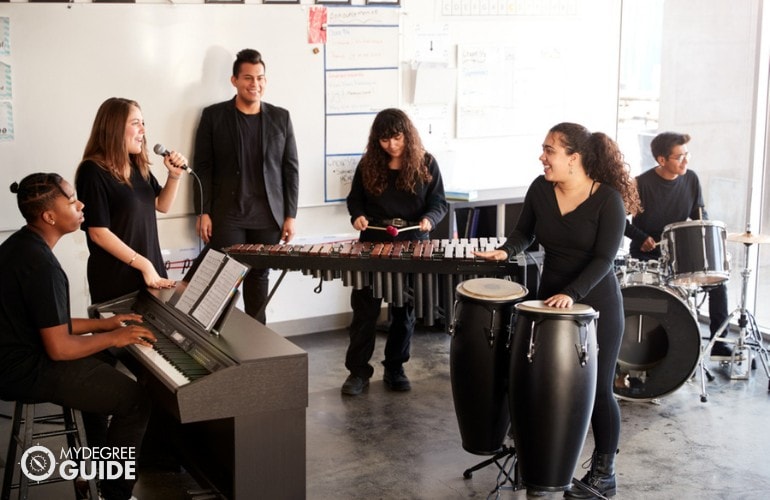A masters in ethnomusicology would allow you to study global music in varied cultural and social settings.

Programs vary among universities, but most combine the academic study of music with fields such as anthropology, language, history, research, or ethnic studies. Some also include music performance.
Editorial Listing ShortCode:
This online music degree may lead to careers in universities, museums, or the music business. Masters degrees in ethnomusicology can also be completed online, allowing you to balance your studies with current responsibilities.
Universities Offering Online Master’s in Ethnomusicology Degree Programs
Methodology: The following school list is in alphabetical order. To be included, a college or university must be regionally accredited and offer degree programs online or in a hybrid format.
Bowling Green State University
Bowling Green State University offers a Master of Music program that includes six specific fields: music theory, music history, music education, performance, composition, and ethnomusicology.
The ethnomusicology program is a 34 credit program that teaches students about the music of Africa, Central Asia, the Middle East, and other far-off countries.
Bowling Green State University is accredited by the Higher Learning Commission.
Liberty University
The Master of Arts in Ethnomusicology program at Liberty University has accreditation from the National Association of Schools of Music and can be taken entirely online. Courses are designed to provide strong foundations in non-Western music theory as well as the scholarship, research, and application of resources into this highly specialized field.
Liberty University is accredited by the Southern Association of Colleges and Schools Commission on Colleges.
Rutgers University
Students in Rutgers University’s Master of Music in Music Education program will enjoy a comprehensive curriculum consisting of courses in music education, history and theory, and ethnomusicology. The program is designed for current music teachers looking to improve their skills and enhance their knowledge, but it doesn’t lead to licensure.
Rutgers University is accredited by the Middle States Commission on Higher Education.
Tarleton State University
Tarleton State University’s Master of Music in Music Education program has six start dates each year, and students can take the program entirely online in a series of 8 week courses. The program isn’t strictly an ethnomusicology program, but there are various ethnomusicology electives students can use to customize their curriculum.
Tarleton State University is accredited by the Southern Association of Colleges and Schools Commission on Colleges.
University of North Carolina – Greensboro
University of North Carolina – Greensboro’s Master of Music in Music Education program is designed for current music educators. It boosts their scholarly and creative skills, advances their knowledge, and improves their teaching capabilities. Students can choose from a wide variety of electives to focus their studies to a specific concentration.
The University of North Carolina at Greensboro is accredited by the Southern Association of Colleges and Schools Commission on Colleges.
University of Texas – Rio Grande Valley
There are four concentrations in University of Texas – Rio Grande Valley’s Master of Music program, one of which is Ethnomusicology. The plan of study for this degree provides students with ample opportunities to study world music. A particularly heavy focus is placed on the musical history, styles, and instruments of Mexico.
The University of Texas Rio Grande Valley is accredited by the Southern Association of Colleges and Schools Commission on Colleges.
Wesleyan University
Wesleyan University offers a Master of Arts Theses in Ethnomusicology and Composition and a PhD in Ethnomusicology.
Both graduate programs include opportunities for students to participate in individual and ensemble study and performances. The curriculum includes studies of Indonesian, African, West African, Euro-American, South Indian, and East Asian music, among others.
Wesleyan University is accredited by the New England Commission of Higher Education.
Online Masters in Ethnomusicology Programs

An online masters in ethnomusicology is ideal for those with an undergraduate degree in music who wish to probe further into music history, theory, practice, or cultural diversity. You will study music from historical and anthropological perspectives and learn how people communicate through music.
Ethnomusicology programs will most likely include classes about music from historical, critical, and theoretical perspectives. They might include ethnomusicology, music and community, global music, anthropology of music, and themes in regional music. You will learn about music from its earliest incarnations to today’s hits.
Many of your courses will include fieldwork designed to give you experience in all aspects of ethnomusicology, including the cultural, sociological, historical, and anthropological. Other disciplines that cross over into ethnomusicology will enrich your studies.
Most degrees also require an original thesis. Depending on your area of interest, you might use your masters degree to teach at universities both here and abroad. You may work in a museum or library or within the music industry. You could also go on to earn a doctoral degree, which is often necessary for a career in academia.
Ethnomusicology degrees are located in different university departments. Most are housed in departments of music or musicology. This may lead to performance opportunities and collaborations with other performers. You may also write program notes or deliver audience talks.
Some masters programs in ethnomusicology are flexible. They might permit interdisciplinary majors that combine music with women’s studies, ethnic studies, gender studies, literature, dance, or art history. Another area of study may focus on the music of one particular country or region.
You may investigate all aspects of the music of Africa, the Caribbean, Native America, or the Middle East. For each, you will learn about the cultural, ecological, historical, and legal aspects of music-making.
If you want to combine voice or instrumental performance with your academic studies, some universities focus on the links between live music and scholarship. This may lead to opportunities for creating projects related to thesis ideas about music and the people who make it.
Ethnomusicology Careers & Salaries

Your degree is likely to concentrate on your particular area of interest, so the range of possible careers and their salaries will vary widely.
For example, if your main focus is to be a musician, then your annual earnings would depend on how many projects or performances you booked. According to the Bureau of Labor Statistics, the median hourly wage for a musician is $31.40.
If your ultimate goal is to teach at a university, then you may need to go on to earn your doctorate. Luckily, a masters can be a great step toward a doctoral degree. Since music is such a popular leisure activity, and because technology is making it possible to listen to music anywhere at any time, new opportunities in this field are emerging.
The Bureau of Labor Statistics may help give you an idea of some more traditional professions this degree may lead to:
| Careers | Annual Median Salaries |
| Postsecondary Music Teacher | $69,690 |
| Anthropologist | $66,130 |
| Historian | $63,100 |
| High School Teacher | $62,870 |
| Curator | $56,990 |
| Archivist | $56,760 |
Some emerging positions that might be of interest to musicologists include music catalog creator, music researcher, and market researcher for music. There are not yet standard payments for these new fields, so how much you are able to earn currently depends on the specific project and employer.
People in the music industry need ethnomusicologists to help them select appropriate music for projects that take place around the globe and through digital music services. Ethnomusicologists may also find employment in a variety of museums that wish to integrate information about global music into their collections.
You may help them build and maintain their offerings and help them write appropriate educational materials and catalogues to support exhibits.
If research is your primary interest, then your salary will often depend on the funding source for your research. You could be part of a university fellowship program or could be sponsored by educational institutions, private foundations, or government or private entities.
MA in Ethnomusicology Curriculum and Courses

Ethnomusicology curricula will depend on the university you attend. Many combine core curriculum courses with elective courses. Most universities recognize the interdisciplinary nature of your studies and include courses from many related fields.
Here are some sample courses from foundational, interdisciplinary, and music subdisciplines:
- Introduction to Ethnomusicology: This course combines music performance with the study of the culture and languages, covering history, scope, definitions, and issues.
- Ethnomusicology History: This course covers the study of music as a part of culture, focusing on historical background and its relationship to today’s culture.
- Storytelling Through Music: This course explores how music conveys ideas about the society which produces it and how music can blend with spoken and written ideas.
- Ethnography: You’ll learn appropriate research methodology that you may use in a scientific study of a culture or society and the music it produces.
- World Music: Every country and its diverse people have their own ways to express their culture through music, and learning about it provides a foundation to your own research agenda.
- Ethnomusicology Methods and Theories: You’ll learn research methods and theories as they apply to the study of music, with an emphasis on issues.
- The Meaning of Music Cultures: You’ll study a range of ideologies and processes that investigate global music cultures through a crosscultural lens.
- Interdisciplinary Studies: Students may take graduate courses in related fields and learn to apply music themes to areas such as anthropology, sociology, or ethnic studies.
- Music in Global Societies: Students can choose from courses that examine music from one other country or region, such as China, Africa, or Latin America.
- Thesis: This class will help students select a topic and prepare to do the research, writing, and thesis defense that may be required for graduation.
Similar to other online masters programs like a masters in music education online, a program’s curriculum will often reflect their particular interests and specialties since they are developed by the faculty at each institution.
Admissions Requirements

Each university has its own admissions requirements, but the following are generally required to enroll in ethnomusicology masters programs:
- Undergraduate degree: An undergraduate degree in music is often required. Another alternative is to have a strong music background with proof of training and experience plus a bachelor’s degree in another field.
- Transcripts: Official transcripts from a regionally or nationally accredited bachelor’s degree, often with a minimum GPA of 3.0, may be required. Proficiency in a foreign language may be required as well.
- Written essay: You may need to write a statement of purpose that includes your career hopes and desired learning outcomes. Alternatively, you may need to include a research paper that demonstrates writing and research skills.
- GRE or GMAT scores: GRE or GMAT scores are often suggested but not always required, so you may want to read your applications carefully to see if either is necessary.
Along with these criteria, you may have to pay application fees that are generally non-refundable. Applications may ask for different required materials and have various deadlines, so if you’re applying to more than one program like to an online masters in music business, you may want to read each one carefully.
Accreditation
Most employers and further graduate studies require a regionally accredited degree. The Council for Higher Education Accreditation (CHEA) grants accreditation to institutions that demonstrate the quality and accountability that meets its eligibility standards.
You may also consider looking at the National Association of Schools of Music, which establishes national standards for graduate degrees, to see if schools you are considering are listed. Faculty, curriculum, and facilities are all regularly reviewed in person, and written reports are required prior to receiving accreditation.
Financial Aid and Scholarships

If you choose to pursue an online graduate degree, you’ll already have taken a step toward getting an affordable education. Saving room and board can definitely help. You may also fill out the Application for Federal Student Aid (FAFSA).This program is sponsored by the Department of Education and has a helpful and easy-to-use website.
Most universities have offices of financial aid staffed with experts who can guide you through the process as well. Need-based tuition reduction programs, fellowships and teaching assistant positions, and other public and private scholarship programs may also be available depending on your eligibility.
What Can You Do with a Masters in Ethnomusicology?

There are many career opportunities for an ethnomusicologist who wishes to teach or conduct research in educational fields.
At universities, many music departments have concentrations in the field, and students’ growing interest in global music, cultures, and societies make this a growing area of need. Tenure-track teaching positions will require a doctorate, though.
In addition to teaching, a masters degree in ethnomusicology can lead to careers in museums. You may create exhibits or work on catalogues or other materials to help visitors. Technology has also created new opportunities for ethnomusicologists who can assist with creating content for digital music services.
How Long Does It Take to Get a Masters in Ethnomusicology Online?

The number of units required for a masters degree will differ for each program. Most require 32 units to 48 units and may also require the completion of a thesis. If you attend full-time and take 12 units per semester, it may take less than 2 years to finish your coursework. Thesis completion may extend this time.
Universities realize that many students enrolled in online masters programs are working full-time and are only able to enroll in about 6 units per semester. This plan will allow you to complete your required classes in about 6 semesters. Writing and defending your thesis may add additional time.
How Much Do Ethnomusicologists Make?
Salaries for ethnomusicologists will depend on the career they choose to pursue. Many will work in academia.
According to the Bureau of Labor Statistics, while salaries will range depending on the type and location of the university, the average postsecondary music teacher position pays an average of $69,690 each year. The average salary for a high school music teacher is closer to $62,870.
Museum work will pay approximately $45,710, but there are no salary rules in this specific field. Digital music and specialized research that are linked to projects may be more lucrative, depending on the opportunity.
This field may also allow you to travel the world researching music linked to various cultures, which can be a sort of additional payment in itself.
Is a Masters in Ethnomusicology Worth It?

Yes, a Master of Ethnomusicology is worth it for many students. In the education, training, and library field, jobs are projected to grow at a rate of 5% in the next 10 years (Bureau of Labor Statistics), faster than the average overall growth for all occupations.
Common ethnomusicology careers in this field include museum archivist or curator, music researcher, high school music teacher, and postsecondary music teacher. Salaries are only a small part of an ethnomusicologist’s rewards.
You may have the chance to travel to countries or regions where you can research the people, music, and instruments that make a culture unique. This cross-disciplinary field lets you pursue your interests wherever they take you.
Getting Your Masters in Ethnomusicology Online

Do you love music? Do you love to travel or to teach? Do you love learning about other cultures? If you identify with any of these questions, an accredited masters degree in ethnomusicology may lead you to fascinating, cross-disciplinary careers that allow you to study global music and the people who make it.
This degree combines music with scholarship. It may open doors to professional careers at universities, museums, libraries, music publishing, arts administration, and performance venues. Why not consider taking that first step toward a career with limitless possibilities and rewards today?
